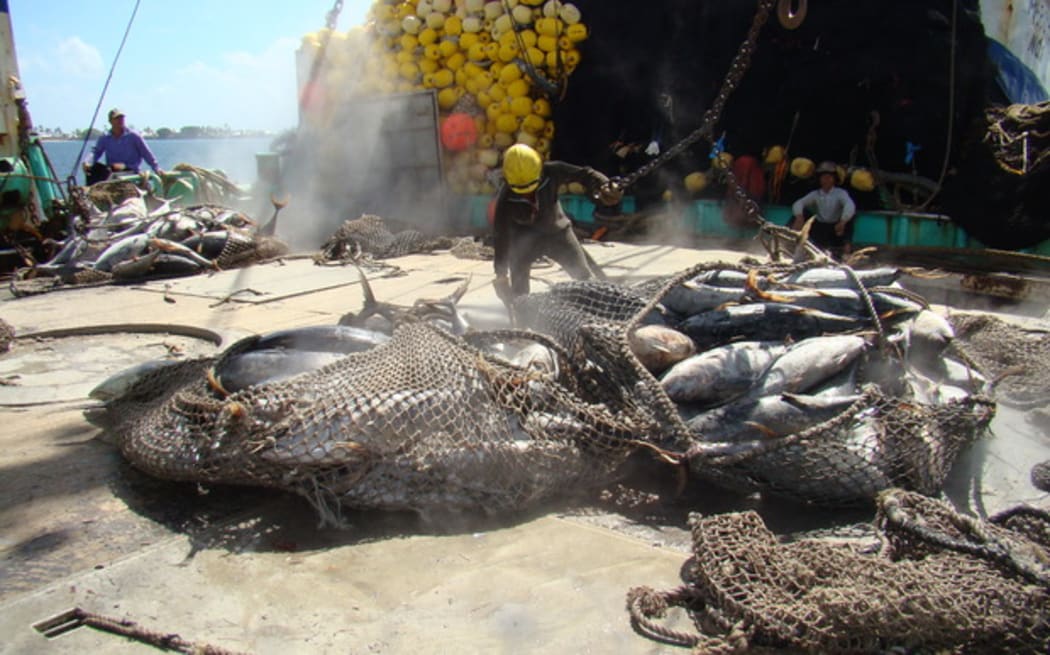The future of tuna fisheries management in the region could be at stake this week ( of Dec 4) as the Western and Central Pacific Fisheries Commission meets in the Philippines.
Distant water fishing nations are expected to push for a change to the zone management system employed by island countries, that are Parties to the Nauru Agreement, whose combined exclusive economic zones account for 85 percent of the tuna caught in the region.
Central to this is system is the Vessel Day Scheme by which each country is given a set number of fishing days per year which it can then sell to interested fishing nations.
Koroi Hawkins spoke with PNA chief executive Ludwig Kumoru about the issues ahead of the summit.

Tuna on the deck of a Pacific fishing vessel.
Photo: RNZI/Giff Johnson
Transcript
LUDWIG KUMORU: Well this push is coming from the bigger nations, the developed nations, those who have been fishing, those who have the fishing boats.
KOROI HAWKINS: And what are they proposing?
LK: They are proposing that allocations within the WCPFC including our own waters they are proposing that allocations whatever they get even in our waters belongs to them. Let me give an example from the zone based management. In a zone based management, everything, all the management measures we put in our waters the coastal states we decide what happens in our waters who comes and fishes in our waters, who do we give the right to come and fish in our waters. That is under the zone based management. But now with the flag state allocation or control what they mean is when I come and fish in your waters whatever I catch is mine. So every year you give me what I caught. You allocate me as a permanent. So in other words they are claiming a right within your right, It should be the other way.
KH: And it also, that cuts into the competitiveness and the economics of it as well doesn't it?
LK: Yes, then you have no choice to invite somebody who your relationship with different fishing nations. It locks you in that you cannot even develop because those days are being claimed by somebody.
KH: And also the reason for the days longer term is for local Pacific Island fleets to develop and be able to use their own days.
LK: Yes. See what is happening now is under the UN clause the coastal states with the EEZs they are supposed to use this. Exploit and explore the resources that is within these EEZs but it also says that if we cannot use all of it then we can sell the surplus to somebody else. And that is exactly what we are doing. Because we cannot exploit it ourselves we are getting other people to use it. It is a right that we are giving to somebody. But the day will come when our own people, we have to give them room, when they develop those other people who are fishing in our waters by invitation have to be prepared to go. We see the examples in these developed countries let me take for example the Philippines. The Japanese used to fish their waters there. And when the Philippines learned about fishing they started to go into commercial fishing the Japanese move out. So the Philippines now control everything in the Philippines' water. The US is the same. Alaska used to be it was the Japanese and the Russians fishing those waters. When the citizens of the country were able to build up and able to fish and the foreigners had to move out. And that is the same thing with the Pacific Islanders. One day. We cannot say we will never build up. One day we will also be able to build up and be able to fish and when we fished they should be able to move. But the way they do it is no they want to lock us in so we will never develop.
To embed this content on your own webpage, cut and paste the following:
See terms of use.


